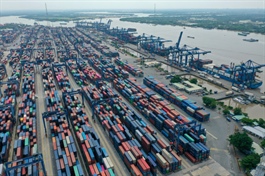Port industry to maintain strong growth through 2022
Port industry to maintain strong growth through 2022
Viet Nam's port industry will likely maintain its growth streak throughout the end of the year and into 2022, thanks to the recovery of the global economy and the number of free trade agreements which the country is a part of.

The flow of cargo through Viet Nam's seaports has been forecast to increase in double-digit numbers, by 15 per cent in 2021 and 14 per cent in 2022.
The industry's growth has been a rarity during the pandemic and subsequent economic downturn caused by major cities and provinces going into lockdown during the record fourth wave of COVID-19 in the country.
Contributing factors to this success include mass vaccination drives around the globe, which has sped up recovery in key markets such as the US and the EU, and several free trade agreements that have gone into effect, giving the export economy a boost, experts said.
The EU–Viet Nam Free Trade Agreement (EVFTA) in particular has been a boon to Vietnamese exports, according to economist Vo Tri Thanh.
During the first six months of 2020, Viet Nam's exports to the EU declined by 8.9 per cent year-on-year. After the trade deal went into effect on August 1 the country managed to close 2020 with a negative growth of 3.4 per cent, thanks to a large surge in exports to the European single market during the second half of the year.
In the first three quarters of 2021, Viet Nam's exports to the EU increased by 11.7 per cent year-on-year as Vietnamese exporters ramped up their effort to penetrate the EU markets.
Viet Dragon Securities, a major securities firm in Viet Nam, said the industry is likely to continue growing in the short to medium term, thanks to a combination of global vaccination programmes and the recovery of trade and commerce.
The firm based its prediction on the Vietnamese Government's objective of vaccinating as much as 70 per cent of the population by the end of the first quarter of next year.
The port industry will benefit as the economy bounces back, said a report by Agriseco, a securities firm under the Vietnam Bank for Agriculture and Rural Development (Agribank).
There is a direct correlation between commercial activities and the port industry growth, the report said. As manufacturing industries and exports make a comeback after a prolonged hiatus, due to the virus, the industry will likely maintain double-digit growth in the near future.
In addition, shipping costs have steadily risen. A recent report by the SSI Securities Corporation noted that shipping costs have risen by 70-160 per cent and the cost for empty containers has risen by 20-50 per cent since the beginning of the year, across a number of shipping routes.
As demand shows no signs of slowing down and will likely pick up between now and the end of the year, shipping companies are expected to continue to grow, even against a backdrop of an overall gloomy economic outlook.
Infrastructure upgrades
Most industry growth has been forecast to take place in deepwater seaports such as Lach Huyen and Cai Mep-Thi Vai port complexes, according to BIDV Securities, the securities firm of the Bank for Investment and Development of Vietnam (BIDV).
Deepwater ports are playing an increasingly important role in improving international and domestic shipping companies' operations and efficiency. The recovery of the domestic industrial sectors would likely fuel the industry's immediate growth.
Major efforts have been made to improve Viet Nam's port infrastructure in recent years. Three Vietnamese seaports have been named among the top 50, according to the Container Port Performance Index (CPPI) launched by the World Bank and IHS Markit this year.
Cai Lan International Container Terminal, in the northern province of Quang Ninh, ranked at 46th while Hai Phong Port and Cai Mep International Terminal in the southern province of Ba Ria-Vung Tau ranked at 47th and 49th, respectively.
During the first ten months of the year, the flow of cargo through Vietnamese seaports reached a total of 587 million tonnes, a 2 per cent increase year-on-year. Container cargo, in particular, has been the top performer boasting 20.3 million TEUs (twenty-foot equivalent unit), a 12 per cent increase year-on-year.
Despite the pandemic, Viet Nam's export/import sectors have shown good performance in the first half of the year. The country's total export/import turnover for the first six months of 2021 reached $320 billion, a 32 per cent increase compared to the same period last year.
The country's master plan to strengthen its seaports in the next ten years includes an expected investment of over VND310 trillion ($13.6 billion) in infrastructure upgrades, to modernise the industry in support of future socio-economic development.
The plan aims to connect numerous industrial hubs to seaports, raising the country's cargo flow to over 1,400 million tonnes a year. The international maritime gateways in the northern city of Hai Phong, the southern province of Ba Ria-Vung Tau and the central economic zone will be given priority for development.





















